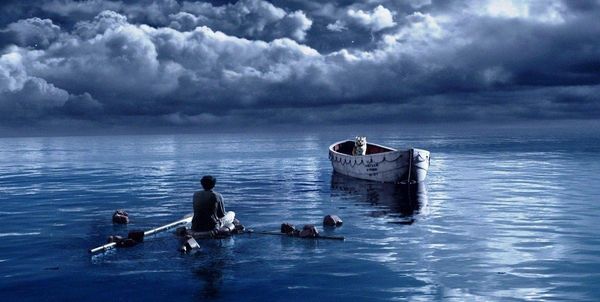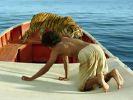Eye For Film >> Movies >> Life Of Pi (2012) Film Review
Life Of Pi
Reviewed by: Anne-Katrin Titze

The introductory credits for the New York Film Festival Opening Night World Premiere of Ang Lee's majestic Life Of Pi in 3D are among the most marvellous images seen on screen. A giant giraffe is looking at you, with a drinking fox nearby, while a hummingbird flies right over our heads. A flock of flamingos stride into the imaginary, as monkeys, zebras, and parakeets do their thing, closer to you than you ever thought possible. A massive bear stands on his hind legs, with the credit announcing the participation of Gérard Depardieu.
I felt a little reminded of the cinematic founding myth, that in 1896, Auguste Lumière and his brother Louis sent shock waves through their audience with the dramatic arrival of a train on the screen in their midst in L'Arrivée D'Un Train En Gare De La Ciotat (1895).

Here we have the arrivals of leopards, spiderwebs, and sloths into the cinema. I give Ang Lee five stars for truly showing his audience something new.
Some things old, borrowed, and a lot of blue are there as well, especially during the time we spend on the lifeboat with Pi (Suraj Sharma in his first acting role) and a Bengal tiger named Richard Parker. (Read more about the fascinating creation of RP, the Bengal tiger in my festival press conference exchange with Ang Lee.)
Pi is named after the Piscine Molitor, a beautiful Art Deco outdoor swimming pool in the 16th arrondissement of Paris, inaugurated by Johnny Weissmüller in 1929. The boy decides to shorten his name in school to avoid being called in unattractive pronunciation pissy.
Based on the best-selling novel by Yann Martel from 2001, a number of scenes look commandeered, as if they belonged to a different movie, a much more conventional story, as in the book.
The narrator of the film is Pi as an older man (Irrfan Khan), who tells the adventure of his life, how he lost his entire family, including his parents' zoo on their emigration from India to Canada when the Japanese ship full of animals sank during a storm at sea, to a writer (Rafe Spall). Pi declares that at the end of the story, told in his rather featureless Canadian living room, to this rather bland listener, he will make him (which probably means us, the audience) believe in God.
It made me believe in floating islands instead. Ang Lee and cinematographer Claudio Miranda's creation, that mixes real animals with computer-generated effects, takes us to a fantastic place in the ocean, made up entirely from what looks like duckweed, seaweed, and frisée lettuce, mixed with fish bones and tree roots that have the interior and texture of watermelon radishes. The mushroom-like inhabitants aren't mere cats. They are meerkats, millions of them, who romp and scamper around glittering pools of freshwater until at night, a great and dangerous transformation takes place while they snuggle on the tree branches to sleep. The Meerkat resting positions and contortions are brilliant choreography.
Ang Lee's version of sacred water holds fluttering jellyfish, giant whales and dolphins that come by to look at what a wet tiger and a skinny boy are doing on the vast ocean that belongs to them.
When he was 12, Pi made a bet with his brother, that he would drink some holy water from a church on a mountain, and as a side effect discovered Christ. He had already met Krishna earlier and clarifies that, as Catholic Hindus, "we get to feel guilty before hundreds of Gods." His father is skeptical about Pi's collector mentality toward religions. "It's like believing in nothing at all," he says, and recommends some reason.
The cargo below the tarp covering the hull of the lifeboat is full of surprises. The endless mystery of what one small boat can hold gives Life Of Pi its suspense.
Seasickness is not limited to humans and the orangutan named Orange Juice can tell all about it. And there is an irresistible hyena acting on its disposition.
Saved by flying fish, with "I'm sorry" his most often articulated sentence, Pi and Richard Parker's journey of discovery is most wonderful when it takes on the miracles of nature. As preparation before seeing the movie, test to see if bananas float, and you won't ever have to say you're sorry you saw this film.
Reviewed on: 30 Sep 2012

















